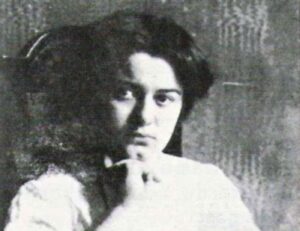The scholar M. D. Aeschliman wrote an essay for First Things last month occasioned by the republication of a little-known 1962 novel by Anthony Burgess, The Wanting Seed. I had not previously heard of this dystopian novel, and Aeschliman’s description drew me to read it: “In the fictional society of The Wanting Seed, abortion, homosexuality, and disdain for the family have become ascendant and are politically privileged.” Because, in the future Burgess imagines, overpopulation has overwhelmed the world’s resources, the state punishes any woman who has more than one child; even if a child dies, a mother is not to have another. This being a work by the author of A Clockwork Orange, The Wanting Seed is unsurprisingly dark, mordantly funny, and written in a richly vivid style that somehow accustoms his readers, without their recoiling, even to scenes of cannibalism as the society appears to collapse. Imagine Evelyn Waugh dropping acid and writing science fiction.
Burgess’s novel got me thinking that a thread running through all dystopias is the totalitarian state’s invasion of every kind of human love (all four loves, as C. S. Lewis might remark). This is true of friendship (philia), familial affection (storgē), and of course charity (agapē), but especially of eros, the love that is fruitful and multiplies. Burgess’s overpopulated state has a Ministry of Infertility—until the cycle of cannibalistic anarchy drives it to drop its prefix and become, at least for the time being, the Ministry of Fertility. To have siblings verges on the scandalous; large families are unheard of; being homosexual is so advantageous to one’s career that one major character pretends to be gay to get ahead.
The all-powerful state’s control of eros is a feature of what is generally considered the first twentieth-century dystopia, Yevgeny Zamyatin’s We. First published in the 1920s, We depicts a society in which people are known by numbers, not names, and in which every building is made of glass so that there is no privacy. Yet each citizen lives alone. There are no marriages, only couplings prearranged in one’s Sexual Table (during which a shade may be decently lowered over the glass wall of one’s apartment). There are no families: the One State, governing a small remnant of the world’s previous population after a devastating war, takes charge of the rearing of all children. We’s narrator-protagonist, D-503, becomes involved with a mysterious, rebellious woman, I-330, and his yearning for her is a kind of rediscovery of long-suppressed nature. Spoiler alert for those who have not read the book: it does not end well for either of them.
George Orwell is said to have been influenced by Zamyatin’s novel in writing Nineteen Eighty-Four, and inasmuch as Orwell’s Oceania is a totalitarian surveillance state, that influence is evident. Unlike Zamyatin’s One State, there are marriages and families in Oceania, but it quickly becomes apparent that the state rigidly controls all relationships, at least among party members (the “proles” can live as they like). Why else must Winston Smith, who is married but separated and childless, and his lover Julia Worthing, a single woman belonging to the Junior Anti-Sex League, resort to secrecy and deception in order to be together? Does the state care about extramarital sexual relations? Probably not as such; what it wants is complete knowledge and control of every kind of relationship. True, Winston and Julia talk privately about how much they hate Big Brother and would like to join a rebellion against his authority, but it is their meeting in private alone that is their first offense against public order.
Start your day with Public Discourse
Sign up and get our daily essays sent straight to your inbox.In Sandra Newman’s 2023 novel Julia, a retelling of Nineteen Eighty-Four from the titular character’s perspective, the Party’s control of eros among its members is an even more prominent feature. In Newman’s tale, Julia Worthing becomes a serial seductress in the employ of the Inner Party mastermind O’Brien, luring not only Winston Smith but two of his co-workers at the Ministry of Truth into affairs in the same dingy upstairs room in a prole district. Julia and Winston are not simply found out by the Thought Police, as in Orwell’s story; she is his knowing betrayer, though she pays a price as heavy as his own.
Newman’s shift of our perspective to Julia rather than Winston enables her to add some features to life in Oceania that are not in Orwell’s book but are consistent with it. The young women in the dormitories of the Anti-Sex League, like Julia, are evidently pledged not to marry, but are eligible to go to a clinic for Artsem—artificial insemination—and thus contribute their offspring to be reared by the state. A select few are even chosen for the Big Future program, to be impregnated by the (purported) seed of Big Brother himself, and given a badge to wear in public announcing the honor that has been bestowed on them. (It is an open secret, however, that single women in the Anti-Sex League sometimes go for Artsem as cover for a pregnancy that has already begun.)
A very different kind of control over eros and reproduction is central to Margaret Atwood’s 1986 novel The Handmaid’s Tale. In Atwood’s dystopian Gilead, a substantial part of North America, a pseudo-Christian, male-dominated tyranny deals with a crisis of infertility by enslaving fertile young women as “handmaids” to the ruling class, to bear the children that cannot be borne by the wives of Gilead’s “commanders.” (To my fellow Christians and conservatives who know Atwood’s book only by reputation, I should say: Never mind the enormous popularity of the book [and of its television adaptation] among progressives for its dark view of a kind of “Christian nationalism,” which is the book’s weakest feature; it is nonetheless a very well told tale.) Each handmaid is a precious broodmare, too important to the society’s future to be given any freedom at all to marry, to raise her own children, to go where she pleases, dress as she likes, live as she likes, even to have her own name. So few and valuable are these handmaids that only a high-status man can have one in his household.
Swinging in quite the opposite direction is This Perfect Day, a 1970 novel by Ira Levin (better known for Rosemary’s Baby and The Stepford Wives, among other books). Like Burgess, Levin imagines a world in which the problem is controlling population growth; unlike The Wanting Seed, This Perfect Day depicts a one-world government that has pretty much solved the problem. A single great computer, Unicomp, runs everything, and its subjects are told what their job will be, where in the world they will do it, whether they may marry and have children—and how long they will live: at age sixty-two, each person is quietly euthanized. Individuals not permitted to marry have girlfriends or boyfriends, but with no possibility of procreation. Every month each person goes for a “treatment,” an injection cocktail of contraceptives, vaccinations against disease, and psychoactive drugs to control mood, disposition, ambition, and curiosity. Regular meetings with one’s “adviser” help to monitor whether any adjustment is necessary in one’s treatments.
Where Burgess and Levin give us overpopulation as the rationale for tyranny, and Zamyatin and Atwood give us underpopulation as its cause, the totalitarian state in Orwell and Newman’s Oceania seems to be both the effect and the cause of endless war. The state’s external enemies serve as justification for its relentless hunt for its internal enemies. But the upshot for the erotic relations of human beings is the same in principle in every case. No one’s loves are his or her own; even the dearest thing of which we say “mine,” another person whose good is identical to our own, is placed beyond our reach, prevented from being really ours.
Is any political order that strives to straighten the crooked timber of humanity once and for all bound to rob us of love?
Nowhere is this sundering of natural loves more central to a dystopian story than in Aldous Huxley’s Brave New World. In the World State, in the year A.F. (After Ford) 632, promiscuity is an ethical expectation, attachment to one person is suspect, babies are gestated entirely in laboratories, children are raised in state nurseries, and the word “mother” is an obscenity. The benign tyranny of empty pleasures, with its cinema “feelies” and the ubiquitous drug “soma,” is the state’s chosen means of control not in order to reduce population or to increase it. Nor is this an Orwellian state at war, its boot stamping on the faces of its own citizens in a desperate bid for order and loyalty. Huxley’s society seems to have achieved a perfect stasis, a status quo of bred-to-purpose class hierarchy with a stable population, and war has apparently been eliminated. Here there is sex but no love; there are co-workers and castes but no friends or families; there are pleasures but no passions, and soma to chase the blues away.
These dystopias—each of which is challenged by characters who glimpse what has been taken from them—raise a question about utopias as well. Is any political order that strives to straighten the crooked timber of humanity once and for all bound to rob us of love?
The answer seems to be yes. I have written elsewhere of the strong affinity of Huxley’s Brave New World to Plato’s Republic. As I read Plato, the “city in speech” described by Socrates is a fantastically ironic project, each outlandish proposition outdoing the previous one. When one reaches the fifth book of the dialogue, one finds Socrates arguing that, for the sake of their total dedication to the city, the guardian class must be deprived of all “mine and thine”—stripped of all property, all privacy; to have no spouses of their own, no children of their own, nothing that can rival their love of the city they govern and defend. It’s quite mad, and there is every indication that Plato knows it is. The reasons given at each step of the argument seem sound; but human lives and human communities are not amenable to being organized into perfect order by abstract reason. Our need for one another—for particular others—cannot be suppressed without unbearable cost.
This is evident, finally, even in the work that gave the genre its name, Thomas More’s Utopia. A subtle and ingenious work with clear debts to Plato, Utopia gives us milder instances of the same tyrannical meddling in natural human loves. Utopians all wear the same drab clothes; the doors of homes have no locks; meals are taken not at home but in common dining halls; after several years families are compelled to change houses, and meanwhile, those with too many children send their excess offspring to homes with too few. All this is by way of attenuating people’s attachment to things, places, and even persons we will claim as peculiarly our own. True, marital fidelity is very strictly enforced; but before any marriage, each spouse is shown completely naked to the other, just as we would expect the saddle and blanket to be removed when we are “buying a colt.” (A pretty shocking idea in the Christendom of 1516.)
It seems the utopian impulse and the dystopian nightmare are never very distant from one another. If we are to love Big Brother, as Winston Smith does at the end of Orwell’s novel, all our other loves must be intruded upon, damaged, even sacrificed entirely. The case for freedom begins with the case for love.
Image by fantom_rd and licensed via Adobe Stock.













